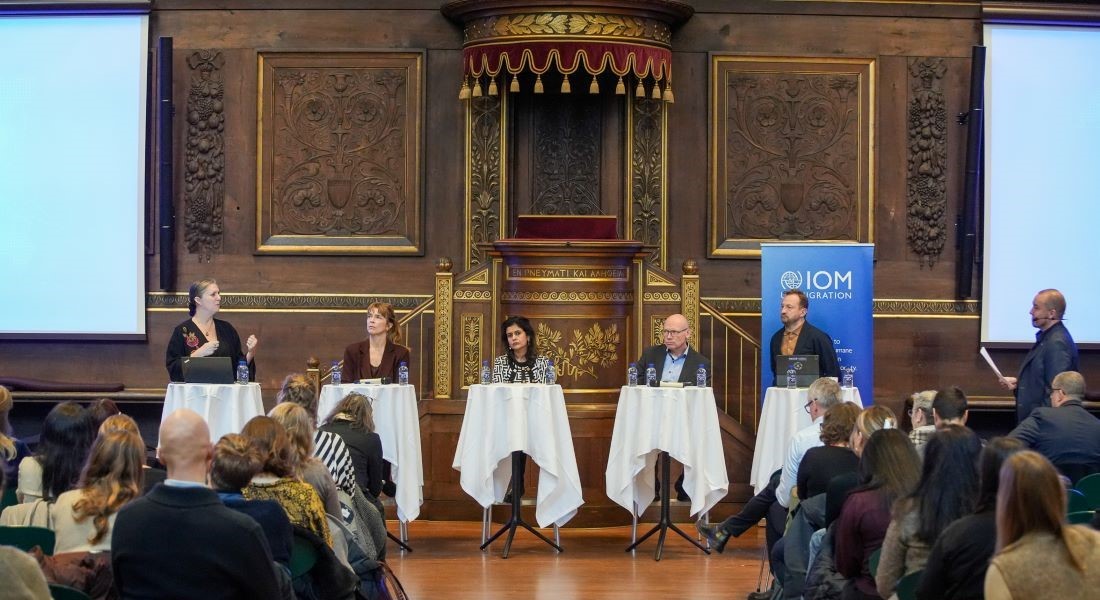UCPH and IOM Promote Regular Migration Pathways to Mark International Migrants Day 2024
UCPH Migration Research Platform, in collaboration with the International Organization for Migration (IOM), hosted a special panel discussion at the University’s Ceremonial Hall to mark International Migrants Day 2024, celebrated annually on December 18 to recognize the efforts, contributions, and rights of the world’s 281 million migrants — approximately 3.6% of the global population.

The event started with a keynote speech by Marie McAuliffe, Chief Editor of IOM’s World Migration Report, who delved into the global key trends and issues on migration and migration governance.
She emphasized how facilitating regular pathways for migration can contribute to greater prosperity in the countries migrants come from and those that host them. The World Migration Report 2024 showed that international remittances surged from USD 128 billion in 2000 to USD 831 billion in 2022, surpassing official development assistance and foreign direct investment globally.
The audience, consisting of university students, representatives from embassies, government and the private sector, learned more about the use of migration data and what global migration data actually show. “It is important to engage with diverse audiences on the facts about migration and bring insights of key researchers from different academic institutions into the public domain as it helps to dispel myths and misconception around migration,” Marie remarked before concluding her presentation entitled ’How migration contributes to societies’.
The panel debate brought together a diverse group of representatives from the Danish research community and the private sector, reflecting on how migration, when it is managed well, can be a powerful force for good and drive sustainable development.
The panelists highlighted different themes related to labour migration, with a focus on Denmark:
- Marie Louise Nørredam (UCPH): Public health dimensions of labour mobility
- Thomas Gammeltoft Hansen (UCPH): Interaction dynamics, dysfunctionality and unforeseen consequences in labour migration laws
- Thomas Qvortrup Christensen (Dansk Industri): Labour migration in Denmark
- Surbhi Changotra Avasthi (Maersk): Perspectives of a migrant worker in Denmark
“Enhancing the integration and social inclusion of migrant workers is key for a dynamic economy,” says John Rand, Professor at the Department of Economics and Head of Studies for Global Development at the University of Copenhagen. “Creating regular migration pathways not only protects migrants but also fosters public trust in migration systems and counteracts labour shortages. We must work toward national talent attraction and retention strategies that ease the process for the state, employers and migrants seeking economic and development opportunities.”
In the spirit of International Migrants Day, this event served as a reminder that migration is a current and historical reality of human existence, as it is natural to strive for a safer place to live, for more economic opportunities, for cultural exchange, for family, for education, for personal development, or for love.
“In recent years, migration has been at the forefront in global discussions and political agendas; this panel discussion underscores the need for inter-disciplinary collaboration on migration data to inform policy makers and the general public,” said Barbara Rijks, IOM Denmark Chief of Mission and Coordinator for the Nordic Countries. “Misinformation often clouds the migration discourse, and brushes over complexities and nuances that give a fuller, more comprehensive picture.”
Addressing the different aspects of human mobility and highlighting recent trends, the event shed light on how safe and regular pathways can positively contribute to the Danish society and beyond. To wrap up the debate, the panellists reminded that migrants take substantial risks on their migration journey and employment, and that enabling migrants to contribute their knowledge, networks, skills and capital to build stronger and more resilient communities requires data-driven and informed decisions.
For more information please contact:
- At UCPH: Alejandra Fierro, Student Assistant for the MSc in Global Development, +45 71 81 09 87
- At IOM: Alessandro Lira, Sub-Regional Media and Communications Officer for Nordic Countries, +45 23 66 76 33
